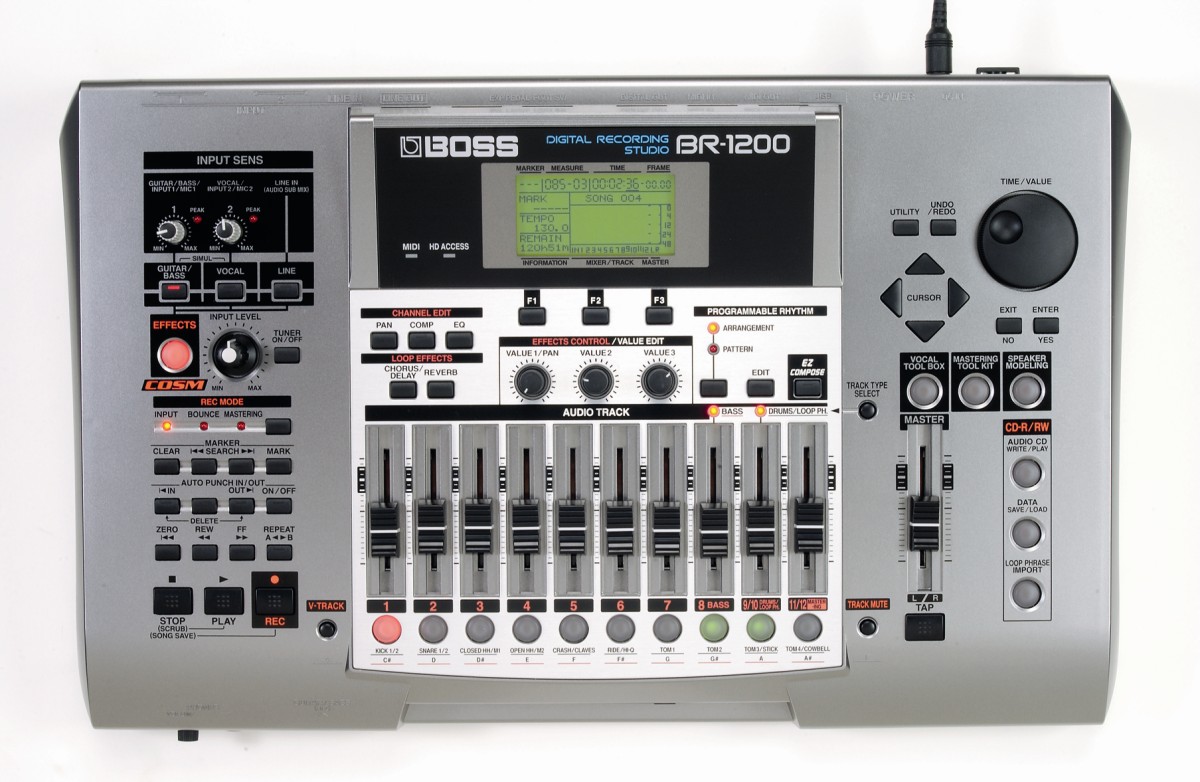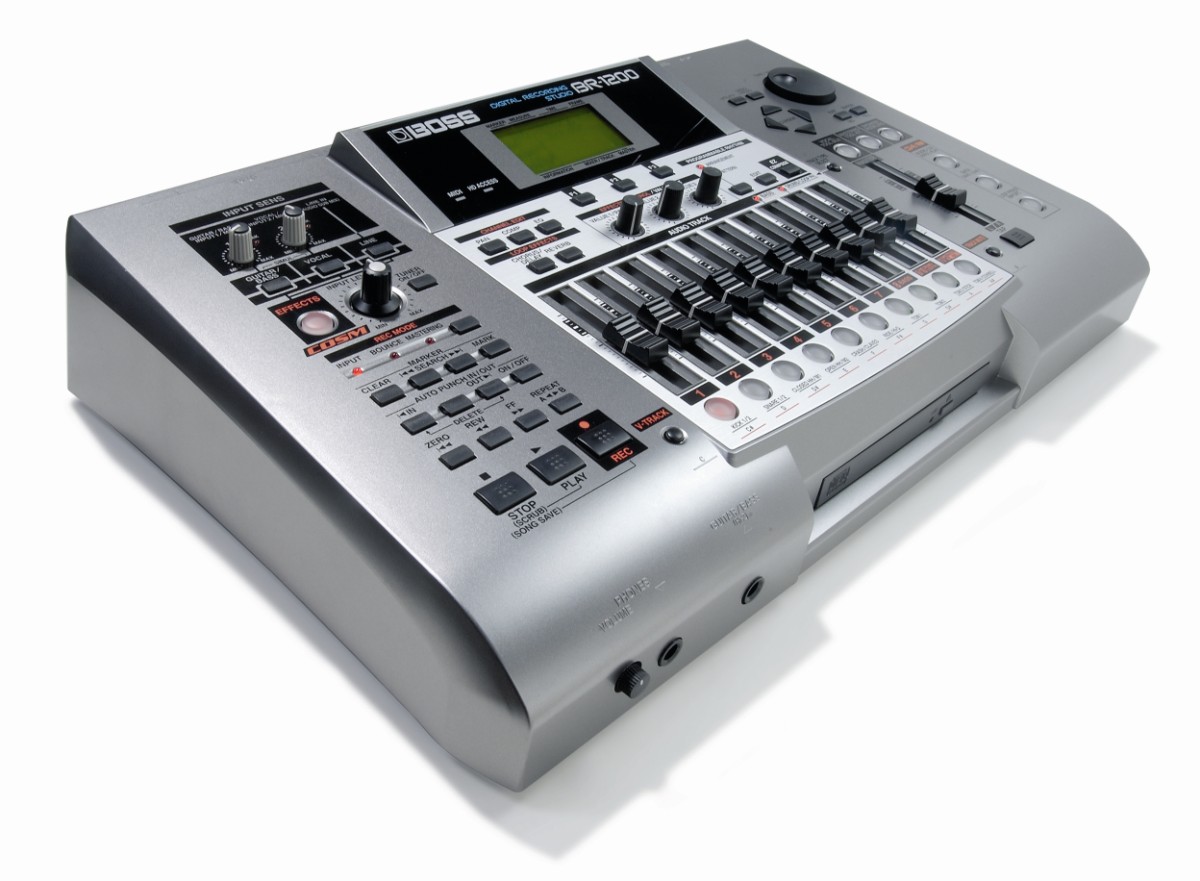MusicRadar Verdict
A user-friendly recordist and songwriter´s tool that provides excellent value for money.
Pros
- +
Easy to use. Good sound quality. Excellent all-in-one solution
Cons
- -
Processing power not ideally shared between compressors and speaker modelling.
MusicRadar's got your back



Boss's BR range of personal multitrackers have found their way into many homes, providing a single box recording facility that's about as user-friendly as these things come. The range also offers a host of special features, including built-in drums, bass and guitar amp simulations.
The BR-1600CD has been the pinnacle of the range so far but has facilities that are perhaps overkill for some users, notably a full 16 tracks and an 8-track simultaneous recording capability with a corresponding number of mic amps.
It's probably fair to say that most of the recordists who use this type of unit will only record one track (stereo or mono) at a time, and may also find that they can get their point across without using 16 tracks. So, there's no point spending extra money when they can get the full BR special features but with just two track simultaneous recording and 12 playback tracks in the lower priced BR-1200CD - a saving of around £300 over the BR-1600CD.
The BR-1200CD records linear CD quality (44.1kHz, 16-bit) audio to an internal 40GB hard drive with backup facilities to the internal CD-RW drive or via USB to computer. There is actually 120 hours of single track recording capacity, so unless you're a real stickler for archiving you can record several albums worth of material on the internal drive. The two input channels allow the option of phantom powered XLR, quarter-inch jack or phono inputs with a specific Hi-Z input also available for plugging guitars in.
Insert effects can be applied to the input signal and recorded. The BR-1200CD has a large selection of these for single sound sources or for when two sounds are being recorded together. The majority of the patches use Roland's COSM modelling to provide amp simulations for guitar. 12 playback tracks seems like plenty to make sophisticated recordings, but there are some restrictions. The tracks are made up of eight mono and two stereo, rather than 12 separate mono tracks. The BR-1200's drum and bass tracks are not independent of the recording tracks so, if used, will take up one stereo and one mono track. There's no dedicated stereo master track, so to do all your mixing and mastering 'in house' you have to use a further stereo track as a mix destination.
Track bouncing, however, is possible to free up tracks for more overdubs, and there are 192 virtual tracks for flexibility in alternate takes. A basic but easily implemented selection of cut, copy and paste editing facilities makes easy work of placing any audio where you need it.
Mixdown facilities include automation in the shape of 100 scenes that can be put under automatic sequential recall as the song plays. Panning, 3-band EQ, plus a pair of send and return effects are available for each track to get a mix into shape.
Want all the hottest music and gear news, reviews, deals, features and more, direct to your inbox? Sign up here.
One of the effects is dedicated to reverb while the other offers a choice of chorus, delay or doubling. Adding a certain amount of insert effects is also possible at mixdown, one useful option being to have a compressor on every track. Amongst the effects you'll also find a Vocal Toolbox with facilities for generating 3-part harmony and correcting vocal pitch. The speaker emulation modelling facility is optimised to work with Roland's DS digital speakers.
A mastering toolkit is also available for a final polish of the mixed down stereo tracks before they're burned to CD.
In use
Like the rest of the BR range, the BR-1200CD is easy to use with all of the basic functions right there in front of you and no complicated menu-hopping before you start recording - ideal for a novice recordist who wants something a little more sophisticated than a basic 4-track as their first machine. Ease of use is typified by three 'soft' value knobs that sit directly below the display. Those knobs are assigned different functions at different times, so make quick work of changing effects parameters, EQ, pan, track compression and mixdown effects.
Recorded sound quality through the input channels' preamps is fine, and the insert effects are high quality. Guitarists will be happy with the patches derived from the GT-6 and GT-6B floor units with all the popular amp options and standard guitar effects alongside some more exotic choices like ring modulation and monophonic guitar synth.
The rhythm programming facility is capable of putting together a fairly sophisticated bass and drums track to underpin whatever you wish to record on top and if you choose to use sampled loops, the BR-1200CD does a neat job of sequencing them together.
If there's any criticism of the BR-1200CD it's in the way that audio tracks have to be set aside for drums, bass and master track - having separate independent tracks for all these would have made the unit a lot more versatile. Also, the way the effects processing power is shared out isn't ideal. It may have been useful to have all the channel compressors and the speaker modelling working at mixdown, but it's one or the other.
Despite the tying up of tracks and the shared DSP power, the BR-1200CD makes a fine noise and is easy to use. There are other machines in a similar price range that give access to more tracks, but the BR-1200CD's strength lies in the well thought out mix and quality of the extra facilities it packs in to help get a song from its initial sketchy ideas to a finished production. It's ideal for a songwriter or guitarist who wants a single machine on which to build a great backing track, record their material to a high standard and then put it on CD.
MusicRadar is the number 1 website for music makers of all kinds, be they guitarists, drummers, keyboard players, djs or producers...
GEAR: We help musicians find the best gear with top-ranking gear round-ups and high- quality, authoritative reviews by a wide team of highly experienced experts.
TIPS: We also provide tuition, from bite-sized tips to advanced work-outs and guidance from recognised musicians and stars.
STARS: We talk to musicians and stars about their creative processes, and the nuts and bolts of their gear and technique. We give fans an insight into the actual craft of music making that no other music website can.
